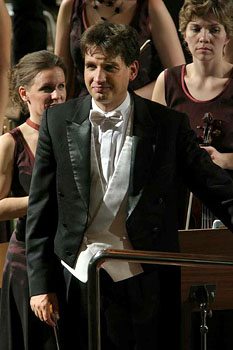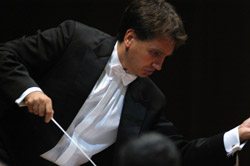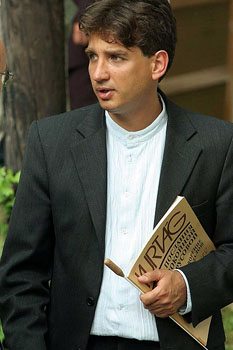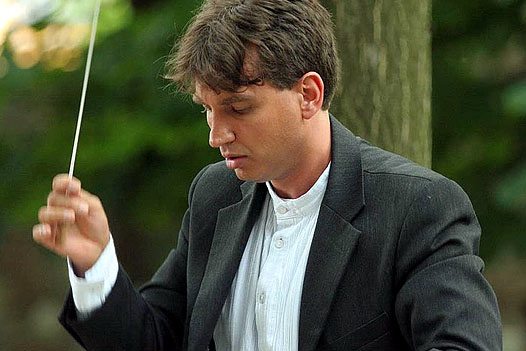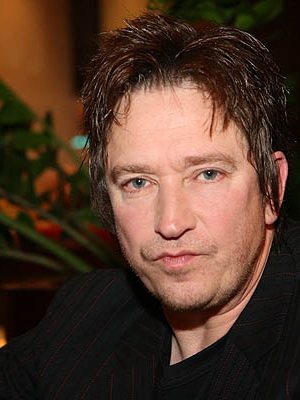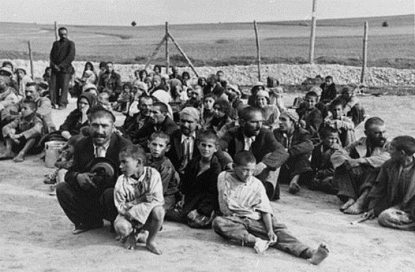You are preparing for a special premiere at the Zürich Opera which will involve three operas. The performance entitled Teatro minimo will premiere on January 25. Did you gladly accept the task?
I enjoy it very much, and it allows me some variety, considering that in the Swiss opera I have conducted two ballets, as well as Cosí fan tutte and Hansel and Gretel. The Pretend Garden Girl, Paisiello's The Barber of Seville and several performances of Carmen are ahead of me. The title role of the Bizet opera will be sung by Vesselina Kasarova and Don Jose will be José Cura and Neil Shicoff. But to conduct a premiere is the really exciting task.
What is your opinion of these works as a composer, considering that you first graduated in the department of composition at the Music Academy and you also wrote some pieces?
I don't consider myself a composer now because for several years all of my time has been spent on conducting. My opinion about contemporary music changed a lot in recent years. I have tried to destroy all the prejudices I grew up with or I myself developed. I have realised they do not lead me anywhere. I want to find out and learn about everything. And then I'll find out if I have an answer to your question. I sometimes feel like the protagonist of the classic joke who hears on the car radio that a madman is driving against the traffic and he shouts, "Not just one madman but everybody." In the past, I often felt that everybody was moving in the opposite direction and more recently, I had to ask myself: am I not driving the wrong way in a one-way street? But let's return to the contemporary works. Three young composers were commissioned by the Zürich opera to write pieces and I can only tell you at the end of rehearsals what I really think about their compositions.
Last year, a travel agency advertised it trips with the slogan: Clap your hands to Zsolt Hamar in Zürich. How does the Hungarian musical scene react to the fact that you receive such prestigious commissions abroad?
I don't know. On the one hand, by becoming the musical director in Pécs, I became a provincial musician, but on the other hand, by receiving many invitations from abroad, I became a foreigner. I do not know what representatives of the music profession who are focused on Budapest know or do not know. These invitations are regarded in Pécs in quite ambivalent ways. Some are proud that their music director is so successful but others process it as less time that I spend in the city.
Yet, the series of international appearances continues considering that you have also been invited to Frankfurt.
I will give two concerts at Alte Oper in the spring and we are also in negotiations about a premiere for 2011. My two-year contract will expire in Zürich this year but I'll soon find out what comes after.
You said everybody was very kind in the Swiss theatre but as soon as someone performs less than perfectly, the air freezes around them.
Yes, I felt this way and therefore I did everything I could in order to produce the best possible performance one night after the other. But I also learnt that this profession is also about what image you can build around yourself and how you make everybody believe in it. And indeed, it was a memorable moment when I first stepped into the building and I was greeted by the manager. In Zürich, I was like a newborn who is surprised about everything around me. I consider it a great gift and honour that I could make friends with László Polgár who works here and I am also pleased to work with singers such as Eva Mei and Jonas Kauffmann, not to mention the directors. I try to sit in at every rehearsal. One can learn a great lot from Nello Santi. And it is really nice to see how colleagues leave their personal problems outside when they enter the building. I can thank the invitation to Zürich for a concert in Linz, after which I was recommended to the Swiss theatre manager.
To what extent does your work in the opera house influence your concerts?
It definitely has an influence. And I must admit that a year and a half ago I was arrogantly thinking that I was professionally ready for an international career. However, in the meantime I had to mobilise much more energy than I had previously expected. We are over a difficult year, lots of blood, sweat and tears. But I learnt a great amount and I do not only mean the scores. There were moments when I felt I had to reconsider everything and I even had to ask the question whether I was technically on the right path. Or other issues, such as what improvisation meant and what my task was as a conductor. If you want to do your job sensibly then you must think after every performance what you did and whether there was a room for improvement. And thinking about it now, I must say I made the right decision when I left the National Philharmonic Orchestra in 2003 and focused completely on the Pécs orchestra. There were many tasks that I could only complete then and there. And I must say it is difficult to baffle me when it comes to orchestras. But I also had to realise that such level of withdrawal and the lack of looking out did not do good to my career as a conductor. So the invitation to Zürich came at the best time...
I think the Pannon Philharmonic Orchestra played an important role in the selection of Pécs to become a European capital of culture in 2010. But as a key player in the project, to what extent are you affected by the ups and downs that surround the programme series?
I think it is revolting what goes on around the European Capital of Culture project and I think the city is only partly to blame. Because there are great many opportunities in all this. If we open the window, fresh air will come pouring in, we can look out and become visible to other countries as well. The project would also offer the opportunity to develop a new cultural centre in a country where everything is completely centred around Budapest, and this will create competition. New participants would appear on the cultural scene and this would have a healthy effect on the entire area. The politicians would also realise how to think about culture with a European approach and how this field needs to be supported....Instead, what I can see is that the project is marred by local or national political in-fighting.
The second half of the next concert season will span over 2010. What programmes are you preparing for it?
I am writing the fifth or sixth plan now for the season....We still do not know what budget we'll have access to and the expectations also keep changing. First they said we needed an international star, but then this idea was scrapped. About a year and a half ago, I spoke with Péter Eötvös, who agreed to give a concert with the Pannon Philharmonic Orchestra in a new concert hall. He said he would welcome the invitation, but ever since, I have not been able to give him any concrete details about when it would take place and how much we could pay. This is only partly Pécs's fault. For the time being, we have to fight hard even for the right to open the concert hall currently in the making.
Are you still planning to invite the Israeli Philharmonic Orchestra for the event?
Not anymore, but the Budapest Festival Orchestra and the National Philharmonic Orchestra would both be willing to appear on stage at the opening concert.
When we last talked about a year ago, you said you were not sure how long you would stay in Pécs. What is your position now?
I find it difficult to decide. If I leave the orchestra, then I will make my choice for a career abroad, although I do not really worry about getting enough work... My contract in Pécs will expire in 2011 and I will surely ask my colleagues then if they want to work with me in the future. If they say yes, then I will have to consider in what form this would be possible....
And what do you think about the continuation of your career? In what direction are you planning to go ahead as a conductor?
I have been very much infected by opera in Zürich....Since I have almost completed the concert repertoire, I would like to expand my knowledge in the field of music theatre.
Are you not bothered that you have not been invited to conduct at the Hungarian State Opera?
You really do not need to feel sorry for me because of this. When I chose the Pannon Philharmonic Orchestra, I gave up on all other work in Hungary. Maybe the time will come for that, too, in the future. And perhaps it is indeed best to return to the Hungarian stage with a great international experience.
Interviewer: Zsuzsa Réfi
